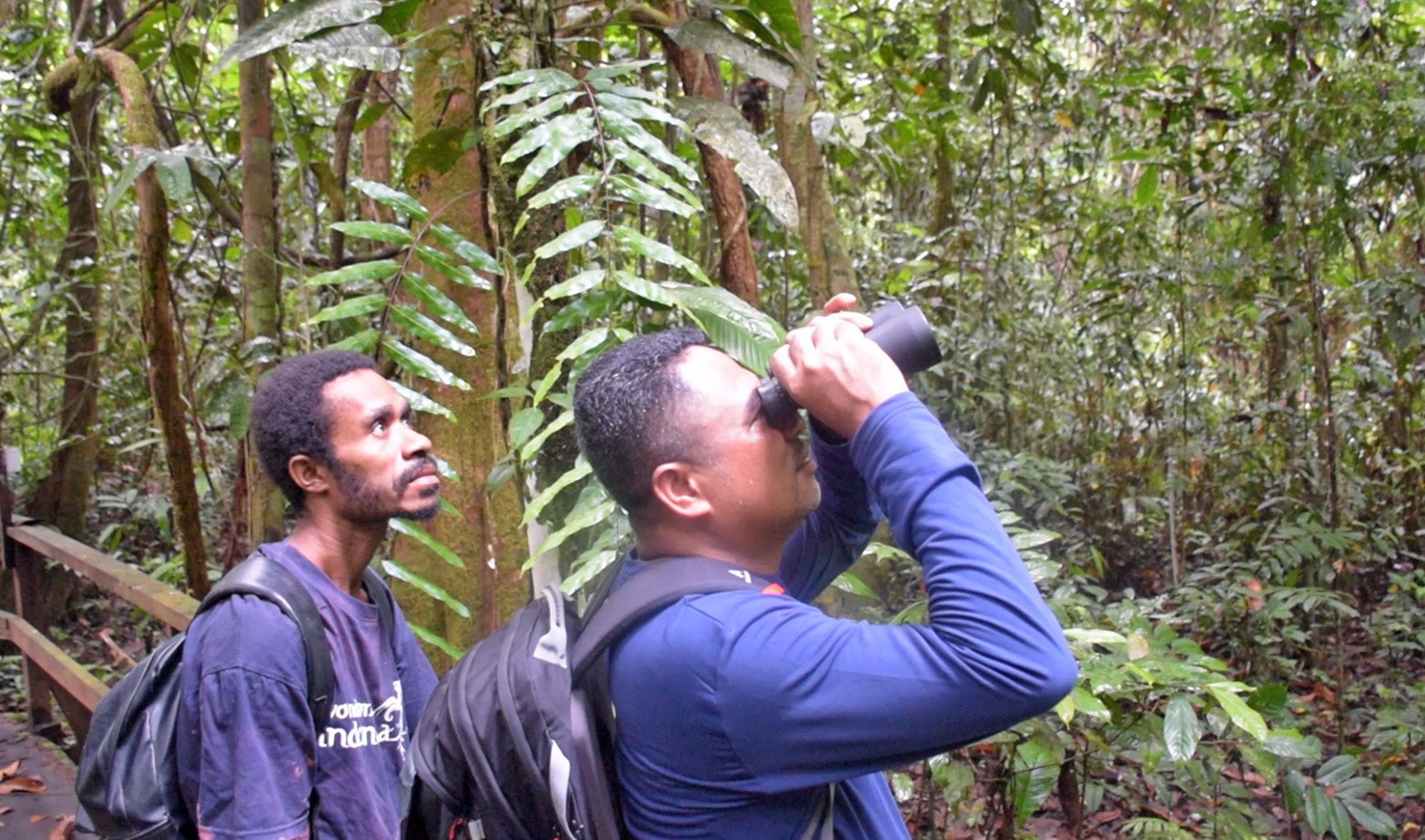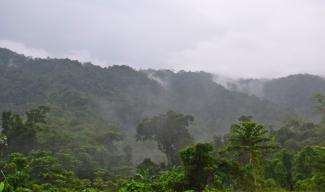One of the easternmost islands in Indonesia, Papua is known by many names. To some, it is referred to as ‘the heaven that fell to Earth’. Anyone who has visited the island and seen its beautiful landscapes or witnessed its wildlife will testify to the accuracy of this description. Integral to the preservation of this heavenly place is the wisdom of Indigenous peoples.
One of these groups is the Moi Kelim Indigenous Community in Klabili Village, Selemkai District. This tribe guards the customary forest area and the natural resources contained therein. However, the Moi Kelim community has long been limited by a lack of official Customary Forest status. To meet these requirements, they must first submit a map of the customary area to the Ministry of Environment and Forestry. And for that they needed support from outside.
Securing Official Status
In 2021, the Samdhana Institute extended a hand to the Moi Kelim Indigenous Community. Working in collaboration with a local institution called Aka Wuon, they began the long process of participatory mapping for customary areas. They started with a four-day training session, held in the office of the regional development planning agency (Bappeda) from 18-21 May 2022 and involving Indigenous people from other clans around Southwest Papua Province.
The training helped Indigenous community members gain a basic knowledge of mapping and how to use mapping tools such as global positioning systems (GPS) to record coordinates and map out forest boundaries, rivers and roads. “Through this training,” explained Aka Wuon’s Soter Hae, “participants will be able to collect social data regarding the boundaries of customary land ownership rights and also the names of important locations, including sacred (ara bouw) and spiritually resonant (serwuon) places.”
In addition, a team comprising representatives from the Samdhana Institute, youth groups, community members and local institutions began mapping the area, working in consultation with tribal elders. The results of the activity were then used as a basis for compiling clan profiles and maps as a requirement of the government’s Customary Forest scheme.
Conservation-based Ecotourism Training
During the mapping activities, youth members of the Moi Kelim Tribe were able to explore the rich abundance of wildlife in their customary territory. To help protect this natural heritage and explore its potential, Samdhana helped the Moi Kelim youth to develop a nature-based tourism management strategy in the Klabili Village area, supported by an ecotourism training programme.
As a result of the training, youth groups from three villages in Selemkai District (Klabili, Dela and Malayauw) identified potential subjects for ecotourism activities in their respective villages and designed prototypes of simple tour packages, which they named the Klabili Birdwatching Tour and the Dela Beach Tour Package.
Samdhana also collaborated with Kaoem Telapak; a Non-Governmental Organization (NGO) that plays an active role in monitoring, mentoring and advocacy for better natural resource management in Papua. Together, they committed to protect and promote the wealth of nature and traditional culture in Klabili Village.
One focal point is a traditional welcoming ritual for guests. “I am very happy that many young people are enthusiastic and still hold cultural values very tightly," said Abu from Kaoem Telapak. “We also want to encourage the culture of eating papeda (sago) in Klabili so they will be proud of their Indigenous food and guests will also appreciate it," said Abu.
Synergy with Government
According to Abraham Mayor, Head of the Tambrauw Regency Tourism Office, ecotourism management suffers from a lack of human resources and supporting infrastructure for tourism services. “We’re trying to improve the facilities,” said Abraham in an interview at his office. “We are building new facilities, assisted by our friends from BUMD (Badan Usaha Milik Daerah, or Regionally Owned Enterprises), and there are homestays, along with capacity building for communities.”
The Tambrauw Regency Tourism Office is currently focusing on promoting a number of tourist destinations in the region, including a leatherback turtle hatchery and birdwatching activities in Selemkai District. According to Abraham, NGOs have an important role to play in development, via funding support, biodiversity studies and mapping customary areas.
This view is shared by the Chairman of the West Papua People's Assembly, Vincentius Paulinus Baru, who believes there is a need to build bridges between government and Indigenous communities. “The government must be there to support what has been done by Indigenous peoples and NGO friends,” said Vincentius. “The government must be there to provide certainty of funding because this is very important in Papua," he added.
By forging collaborative links between government, NGOs, village elders and youth groups, Samdhana hopes to facilitate knowledge transfer, generate funding and explore the potential of various ecotourism activities for the Moi Kelim Tribe. Already, these activities are beginning to have a positive impact.

Birdwatching in Tambrauw
This positivity is embodied by a group of 36 young people from the Moi Kelim Tribe who are members of Sanggar Seni Budaya Alam Semesta Selemkai (SALSES). Together, they founded a Birdwatching Park in Klabili Village which is committed to protecting Papua’s natural heritage through ecotourism.
Yoram Kalami is a member of SALSES. He insists the younger generation of the Moi Kelim are committed to conserving their natural heritage, pointing to a series of customary regulations designed to prevent and punish illegal practices in the forest. “Shooting birds is strictly prohibited,” he says, highlighting the harsh fines and penalties handed out to offenders. “If any bird is killed, they (the perpetrator) must pay a fine of around thirty million rupiah (approx. US$ 1800) for each animal.”
There are also rules to help avoid disruption to wildlife during birdwatching activities. “If observing birds of paradise, they can only be observed in the morning and evening,” explains Yoram, who adds the goal is that “wild animals will not feel disturbed.” Yoram also asks visitors not to use perfume or wear bright-coloured clothes that can disrupt the animals’ natural behaviour.
Integrating Nature and Culture in Ecotourism Management
In addition to birdwatching, Yoram and SALSES also focus on integrating local customs and culture into their ecotourism packages, in an effort to celebrate and keep alive the customs of the Moi Kelim Tribe. In particular, this includes traditional dances which are distinct to the tribe.
“Our dances are different from other places,” explains Yoram. “We do not learn in school but from the traditional elders in the village.” The SALSES studio chose to perform ancestral dances in their original form. “So that we can maintain tradition,” says Anis from the SALSES Studio, who dances along with other members of the tribe, accompanied by music performed on the ukulele, guitar and tifa (a traditional percussion instrument from Papua).
To give visitors an authentic taste of local life, SALSES also serve traditional foods such as sago, tubers, bananas, cassava and taro leaves. “We still eat sago every day,” says Anis. “We make it ourselves using a pangkur (a wooden tool traditionally used for this purpose).”
SALSES often share birdwatching stories and examples of Moi Kelim culture on their official Instagram account, in addition to promotions via a number of travel agents and tourism bureaus in Sorong. They are currently working on a website that will help them to attract even more visitors in future, and share the wonders of the Moi Kelim Tribe with a wider audience.




